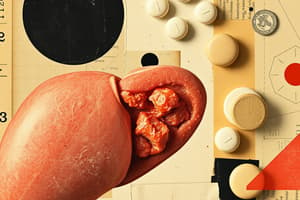Podcast
Questions and Answers
What is the primary process by which drugs are chemically altered in the body?
What is the primary process by which drugs are chemically altered in the body?
- Metabolism (correct)
- Excretion
- Distribution
- Absorption
How does a drug that acts as an agonist interact with receptors?
How does a drug that acts as an agonist interact with receptors?
- It deactivates the receptors
- It inhibits the receptors
- It activates the receptors (correct)
- It blocks the receptors
Which term describes the removal of drugs from the body, primarily via the kidneys?
Which term describes the removal of drugs from the body, primarily via the kidneys?
- Distribution
- Excretion (correct)
- Metabolism
- Absorption
What is the significance of therapeutic drug monitoring?
What is the significance of therapeutic drug monitoring?
What type of testing evaluates the safety and efficacy of drugs before they reach human trials?
What type of testing evaluates the safety and efficacy of drugs before they reach human trials?
Which of the following is NOT a common route of drug administration?
Which of the following is NOT a common route of drug administration?
What does bioavailability refer to in pharmacology?
What does bioavailability refer to in pharmacology?
What does the half-life of a drug indicate?
What does the half-life of a drug indicate?
Flashcards are hidden until you start studying
Study Notes
Pharmacology Overview
- Definition: The study of drugs, their properties, effects, and mechanisms of action in biological systems.
Key Concepts
-
Pharmacokinetics
- Absorption: How drugs enter the bloodstream.
- Distribution: How drugs are transported throughout the body.
- Metabolism: Chemical alteration of drugs, primarily in the liver.
- Excretion: Removal of drugs from the body, primarily via kidneys.
-
Pharmacodynamics
- Mechanism of Action: How a drug produces its effects at the site of action.
- Receptor Interaction: Drugs may act as agonists (activating receptors) or antagonists (blocking receptors).
-
Drug Classification
- By Effect: Analgesics (pain relief), antibiotics (infection treatment), antihypertensives (blood pressure control).
- By Chemical Structure: Compounds with similar chemical properties grouped together.
-
Drug Development
- Preclinical Testing: Laboratory and animal studies to evaluate safety and efficacy.
- Clinical Trials: Human subject testing divided into phases (Phase I – IV) to assess safety, dosage, efficacy, and side effects.
-
Dosing and Administration
- Routes of Administration: Oral, intravenous, intramuscular, topical, etc.
- Dosing Regimens: Specific schedules for drug administration (e.g., once daily, twice a day).
-
Adverse Effects
- Side Effects: Unintended reactions, can be mild or severe.
- Drug Interactions: Effects caused by the concurrent use of multiple drugs.
-
Therapeutic Drug Monitoring
- Important for drugs with narrow therapeutic indices to ensure levels remain within the therapeutic range.
-
Regulatory Factors
- Agencies govern drug approval and monitoring (e.g., FDA in the U.S.).
- Importance of adherence to guidelines and protocols in drug development.
Important Terms
- Bioavailability: The proportion of a drug that enters circulation when introduced into the body.
- Half-life: Time taken for the concentration of a drug in the bloodstream to reduce by half.
- Tolerance: Reduced response to a drug after prolonged use.
- Dependence: Physical or psychological need for a drug, leading to withdrawal symptoms upon discontinuation.
Special Considerations
- Patient Variability: Factors such as age, weight, genetics, and existing health conditions can affect drug response.
- Ethical Issues: Informed consent, access to medication, off-label drug use.
Pharmacology Overview
- The study of drugs, their characteristics, effects, and how they work in living organisms.
Pharmacokinetics
- Absorption: The process of a drug entering the bloodstream.
- Distribution: How a drug travels throughout the body.
- Metabolism: Chemical changes to a drug, mainly in the liver.
- Excretion: Removal of drugs from the body, primarily through the kidneys.
Pharmacodynamics
- Mechanism of Action: How a drug produces its effects at the target site.
- Receptor Interaction: Drugs can act as agonists, activating receptors, or antagonists, blocking receptors.
Drug Classification
- By Effect: Grouping drugs based on their therapeutic actions, like pain relief (analgesics), infection treatment (antibiotics), or blood pressure control (antihypertensives).
- By Chemical Structure: Grouping drugs with similar chemical properties.
Drug Development
- Preclinical Testing: Lab and animal studies to assess safety and effectiveness.
- Clinical Trials: Human testing in phases (Phase I – IV) to evaluate safety, dosage, effectiveness, and side effects.
Dosing and Administration
- Routes of Administration: Different ways to give drugs, such as oral, intravenous, intramuscular, or topical.
- Dosing Regimens: Specific schedules for drug administration, like once a day or twice a day.
Adverse Effects
- Side Effects: Unwanted reactions, ranging from mild to severe.
- Drug Interactions: Effects caused by using multiple drugs together.
Therapeutic Drug Monitoring
- Important for drugs with a narrow therapeutic range, ensuring levels stay within the effective range.
Regulatory Factors
- Agencies like the FDA (in the U.S.) oversee drug approval and monitoring.
- Following guidelines and protocols is crucial in drug development.
Important Terms
- Bioavailability: The amount of a drug that reaches circulation after administration.
- Half-life: The time it takes for a drug's blood concentration to decrease by half.
- Tolerance: Decreased response to a drug after prolonged use.
- Dependence: Physical or psychological need for a drug, causing withdrawal symptoms when stopped.
Special Considerations
- Patient Variability: Factors like age, weight, genetics, and health conditions affect drug response.
- Ethical Issues: Informed consent, access to medication, and off-label drug use.
Studying That Suits You
Use AI to generate personalized quizzes and flashcards to suit your learning preferences.





